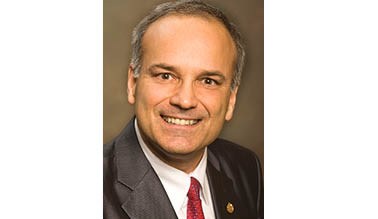Coquitlam voters cast ballots two to one against the Mayors' Council transit plebiscite but that doesn't mean they're against transit and transportation improvements, says the city's mayor.
Richard Stewart said that despite the best efforts to convince voters of the upside of adding 0.5% onto the provincial sales tax (more buses, better roads and cycling infrastructure) and the grid-lock that would worsen without the investment, the vote ended up being a referendum on TransLink governance and accountability.
The vote revealed by Elections BC Thursday morning showed that 67.22% of Coquitlam voters mailed in a 'No' ballot, with 32.78% voting 'Yes".
Now Stewart is waiting to see what the province will come up with next to improve TransLink, and improve funding, without which many important projects will be in limbo. For example, the extra money provided by the additional sales tax would have helped pay for connecting buses to the Evergreen Line when it opens next year.
Now the city might have to consider putting in more parking spaces, at $40,000 apiece, which will end up costing way more than buses in the end.
"TransLink was created by the province, it was amended by the province, it was adjusted by the province and some would say it has been messed up by the province. We desperately need a massive investment into regional transportation but voters are clearly uncomfortable with TransLink. Until we make governance changes to TransLink, there can be no investment in truly regional transportation. That means that cities like Coquitlam will have to do what we can individually to tackle the congestion issues."
WHAT IT PROMISED
For Tri-City residents, the extra funds raised by the sales tax increase would have paid for more frequent all-day service, more frequent peak-hour bus service, more NightBus service, more HandyDart Service, 10 additional fleet vehicles and one new locomotive to the West Coast Express, and road and bikeway improvements. The goal, according to the Mayors' Council, was to get 70% of the region's population within walking distance of frequent transit.
Among the concerns for Stewart, who along with most other regional mayors wanted a 'Yes' vote, was improved transportation to new neighborhoods, such as Burke Mountain.
Now these new buses are in limbo with no Plan B to fund them.
"It has been the most frustrating significant public policy file that I have been involved in," said Stewart.
HISTORY IN THE MAKING
It was five years ago that then-premier Gordon Campbell told a Tri-Cities Chamber of Commerce luncheon at the Vancouver Golf Club that more discussion was needed to find a way to fund transit. At the time, the Evergreen Line funding was still uncertain, but eventually TransLink was able to come up with its share of the $1.4 billion project.
In his speech at the time, Campbell hinted at the referendum to come, noting that transit funding needed more discussion because the government learned its lesson from the Harmonized Sales Tax, which was also defeated in a referendum.
Stewart says it appears little progress has been made in the interim, despite a lot of talk, and efforts to optimize TransLink and make it more efficient. At the core, the problem with TransLink is its lack of accountability and a refusal by the province to make substantive changes while it continues to make its own funding decisions that affect the region, Stewart said, leaving the Mayors' Council with little authority.
"Everyone agrees, this is dysfunctional, the province will make an announcement about new investment in massive transportation infrastructure in the region and then it won't give us the tools to fund a coordinated system of regional transportation. It is frustrating," Stewart said.
As to the future of needed road and transportation, Stewart wouldn't speculate, saying that until TransLink is revamped there is no point in the mayors talking about new investment and how to pay for it.
"My desk has lots of work on it; I don't need to be in useless meeting where we (the region's mayors) don't have a proper role."



